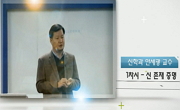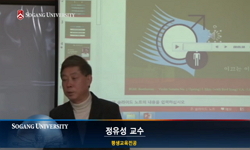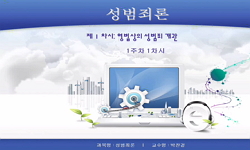In general, this essay is concerned with how to understand Confucius Sinarum Philosophus sive Scientia Sinensis (=Confucius). It focused on exploring the Jesuit`s latin translation of Natura (性) in Confucius, in order to answer the following questio...
http://chineseinput.net/에서 pinyin(병음)방식으로 중국어를 변환할 수 있습니다.
변환된 중국어를 복사하여 사용하시면 됩니다.
- 中文 을 입력하시려면 zhongwen을 입력하시고 space를누르시면됩니다.
- 北京 을 입력하시려면 beijing을 입력하시고 space를 누르시면 됩니다.

쿠플레의 『중국인 철학자 공자』의 「서문」 -Natura(性) 개념의 이해 문제를 사례로- = Special Topic : Some Observations on Philippe Couplet`s Understanding of Confucius Sinarum Philosophus Natura (性)
한글로보기https://www.riss.kr/link?id=A99576508
- 저자
- 발행기관
- 학술지명
- 권호사항
-
발행연도
2012
-
작성언어
-
- 주제어
-
KDC
000
-
등재정보
KCI등재
-
자료형태
학술저널
-
수록면
87-120(34쪽)
-
KCI 피인용횟수
3
- 제공처
- 소장기관
-
0
상세조회 -
0
다운로드
부가정보
다국어 초록 (Multilingual Abstract)
In general, this essay is concerned with how to understand Confucius Sinarum Philosophus sive Scientia Sinensis (=Confucius). It focused on exploring the Jesuit`s latin translation of Natura (性) in Confucius, in order to answer the following question: how did European readers understand Confucius in the 18th century. According to my reading, the concept natura (性) is used to have three meanings: (1) pure reason in terms of religio naturalis, (2) primary matter in terms of physica, and (3) providence faculty in terms of Pu-Ju (補儒) doctrine which means that it (sc. Christianity) supplements and perfects what is wanted in our master Confucius and our philosophy and literatures. Based on this, I have made three comparisons between the natura-concept of Confucius and that of Aquinas, Lucretius and stoic philosophers to whom Cicero and Epictetus belong. The result of my comparisons comes to a new fact that the persona moderna of the Enlightenment might be based in part on Confucius` natura- concept and in part on Cicero`s encyclopedic idea of orator perfectus. For this, I compared Cicero`s thought of orator perfectus with Confucius` idea of vir perfectus. As for the question of how to read Confucius, however, Zhang Si-Ping (張西平), a leading scholar in China argues in the following. First, Confucius is to be read in the perspective of Christianity. Second, Confucius is the answer to the ritual discussions in the 17th century. Third, Confucius is a text which takes a critical position on especially Neo- Confucianism. In brief, Zhang concludes that Confucius is a product of misreading and misunderstanding of Chinese classical texts, but a significant contribution for studying the interrelated history of China and Europe. Grosso modo, I agree with Zhang`s arguments. There are, however, three points on which I do not agree. First, Jesuit`s missionaries tried to read Chinese original texts of Confucius in the eye of Christianity. Onthe other hand, however, Confucius is full of termini technici of Stoic philosophy. In this regard, in my opinion, there was no need then to say about PU-JU doctrine additionally by Siu Paulus (徐光啓). Second, Zhang maintains that one has to be cautious in the interpretation of Confucius because it is a metamorphic text. I think, however, the question is how to approach this metamorphic text. For this, Zhang suggests to readers to have some basic understanding of Christianity. In my view, here should be added some profound understanding of western philosophy, particularly of Hellenistic philosophy, because the problems of metamorphosis of Confucius mostly resulted from the so-to-say abutio-problem during borrowing termini from e.g. Cicero`s terms. As for Zhang`s estimation on Confucius, finally, I am not sure whether it is a product of misreading because, according to my keen reading of the Latin original text, Confucius is actually a metamorphosis text in Ovidius` viewpoint but a hybrid text because it allows at least three ways of interpretation. One of them is a reading with help of Chinese original text, e.g., with the Zhu Xi (朱熹) edition. The second of them is a reading through comparison with western classical texts, in order to see how they are different from each other. The last is an independent way of reading from both sides. The conclusionwhich results from this is that we need to regard Confucius not as a translation but as a kind of original text. Therefore, I suggest to read Confucius and to follow some free reading ways of those who did not know anyway but could not learn Chinese Characters in the 17 th -18 th centuries, such as Christian Wolf.
참고문헌 (Reference)
1 안재원, "쿠플레의 『역경』 이해 -“겸”(謙)괘의 라틴어 번역을 중심으로-" 인문학연구원 (67) : 461-510, 2012
2 판토하, "칠극(七克)" 일조각 2010
3 D. E. 먼젤로, "진기한 나라, 중국" 나남출판사 2009
4 주겸지, "중국이 만든 유럽의 근대" 청계출판사 2003
5 키케로, "의무론(De officiis)" 서광사 1993
6 아퀴나스, "신학대전" 두란노아카데미 2011
7 강대진, "사물의 본성에 관하여" 아카넷 2012
8 오비디우스, "변신이야기" 숲 출판사 2005
9 송영배, "동서 철학의 교섭과 동서양 사유 방식의 차이" 논형 2004
10 안재원, "고대 로마의 이상적 연설가(orator perfectus)론" 한국서양고전학회 (20) : 119-140, 2003
1 안재원, "쿠플레의 『역경』 이해 -“겸”(謙)괘의 라틴어 번역을 중심으로-" 인문학연구원 (67) : 461-510, 2012
2 판토하, "칠극(七克)" 일조각 2010
3 D. E. 먼젤로, "진기한 나라, 중국" 나남출판사 2009
4 주겸지, "중국이 만든 유럽의 근대" 청계출판사 2003
5 키케로, "의무론(De officiis)" 서광사 1993
6 아퀴나스, "신학대전" 두란노아카데미 2011
7 강대진, "사물의 본성에 관하여" 아카넷 2012
8 오비디우스, "변신이야기" 숲 출판사 2005
9 송영배, "동서 철학의 교섭과 동서양 사유 방식의 차이" 논형 2004
10 안재원, "고대 로마의 이상적 연설가(orator perfectus)론" 한국서양고전학회 (20) : 119-140, 2003
11 張西平, "第十七章 栢應理與中國儒學西傳" 412-460, 2009
12 井川義次, "宋學の西遷" 人文書院 2009
13 R. Malek, S.V.D., "“Western Learning” and Christianity in China, In The Contribution and Impact of Johann Adam Schall von Bell (1592-1666), In Monumenta Serica Monograph Series Vol. XXXV/1-2" 1998
14 "perfectus"
15 G.M. Pachtler S.J, "Ratio Studiorum Institutiones Scholasticae Societatis" Berlin 1832
16 Chrstian Wolf, "Psychologia Rationalis" Franckfurt et Lipsia 1734
17 Chrstian Wolf, "Psychologia Empirica" Franckfurti et Lipsiae 1732
18 Christian Wolf, "Oratio de Sinarum philosophia practica(Michael Albrecht(역주,1988)" Hamburg 1988
19 L. Pfister, "Notices Biographiques et Bibliographiques sur les Jesuites de L’ancienne Mission de Chine 1552~1773"
20 Julia Ching, "Moral Enlightenment: Leibniz and Wolf on China(Monumenta Serica XXVI" Sankt Augustin 1992
21 L. M. Jensen, "Manufacturing Confucianism" Duke University Press 1997
22 Kim, Young Kun, "Hegel’s Criticism on Chinese Philosophy, In Philosophy East and West" Hawaii University 173-180, 1978
23 "Commentariis Collegii Conimbricensis e Societate Iesu, In Vniversam Dialecticam Aristotelis Stagitritae" Moguntae 1606
24 Willy Richard Berger, "China-Bild und China-Mode im Europa der Aufklaerung" Koeln 1990
25 "CONFUCIUS SINARUM PHILOSOPHUS SIVE SCIENTIA SINENSIS LATINA EXPOSITA, Studio et opera PROSPERI INTORCETTA, CHRISTIANI HERDTRICH, FRANCISICIS ROUGEMONT, PHILIPPI COUPLET, Patrum Societatis (1687), Jussu LUDOVICI MAGNI Eximio Missionum Orientalium et Litterae Reipublicae bono E BIBILOTHECA REGIA IN LUCEM PRODIT. ADJECTA EST TABULA CHRONOLOGICA SINICAE MONARCHIAE AB HUIUS EXORDIO AD HAEC USQUE TEMPORA, Paris.: 중국의 철학자 공자 혹은 중국의 학문"
26 Ahn, Jaewon, "A comparative research on Cicero’s orator perfectus and Confucius’ Rex"
동일학술지(권/호) 다른 논문
-
영화음악으로 해석한 식민지 조선 영화 「반도의 봄」(半島の春)
- 서울대학교 인문학연구원
- 이경분 ( Lee
- 2012
- KCI등재
-
- 서울대학교 인문학연구원
- 서진영 ( Jin Young Seo )
- 2012
- KCI등재
-
시간의 비결정성과 주체의 구성과정 연구 -강은교의 중기시를 중심으로-
- 서울대학교 인문학연구원
- 김정현 ( Jung Hyun Kim )
- 2012
- KCI등재
-
고고학 해석의 지평 넓히기 -고고학 자료에 대한 다양한 인식 검토-
- 서울대학교 인문학연구원
- 고일홍 ( Il Hong Ko )
- 2012
- KCI등재
분석정보
인용정보 인용지수 설명보기
학술지 이력
| 연월일 | 이력구분 | 이력상세 | 등재구분 |
|---|---|---|---|
| 2026 | 평가예정 | 재인증평가 신청대상 (재인증) | |
| 2020-01-01 | 평가 | 등재학술지 유지 (재인증) |  |
| 2017-01-01 | 평가 | 등재학술지 유지 (계속평가) |  |
| 2015-01-07 | 학회명변경 | 영문명 : Seoul National University Institute of Humanities -> Institute of Humanities, Seoul National University |  |
| 2015-01-06 | 학술지명변경 | 외국어명 : Seoul National University the Journal of Humanites -> Journal of Humanities, Seoul National University |  |
| 2013-01-01 | 평가 | 등재 1차 FAIL (등재유지) |  |
| 2010-01-01 | 평가 | 등재학술지 유지 (등재유지) |  |
| 2007-01-01 | 평가 | 등재학술지 선정 (등재후보2차) |  |
| 2006-01-01 | 평가 | 등재후보 1차 PASS (등재후보1차) |  |
| 2004-01-01 | 평가 | 등재후보학술지 선정 (신규평가) |  |
학술지 인용정보
| 기준연도 | WOS-KCI 통합IF(2년) | KCIF(2년) | KCIF(3년) |
|---|---|---|---|
| 2016 | 0.71 | 0.71 | 0.68 |
| KCIF(4년) | KCIF(5년) | 중심성지수(3년) | 즉시성지수 |
| 0.68 | 0.62 | 1.317 | 0.2 |




 KISS
KISS







